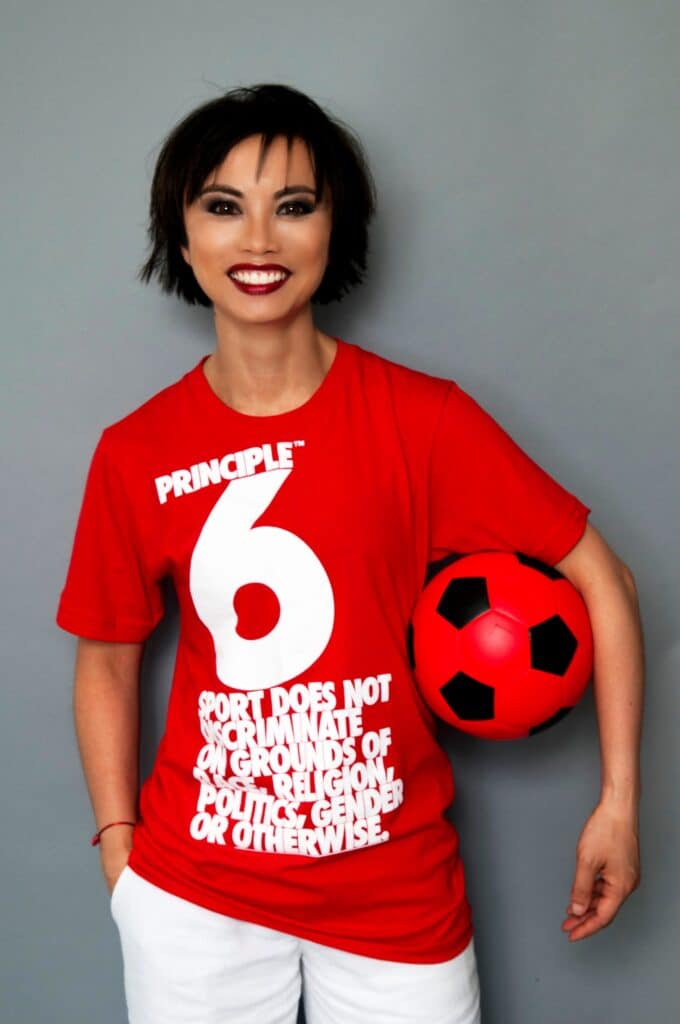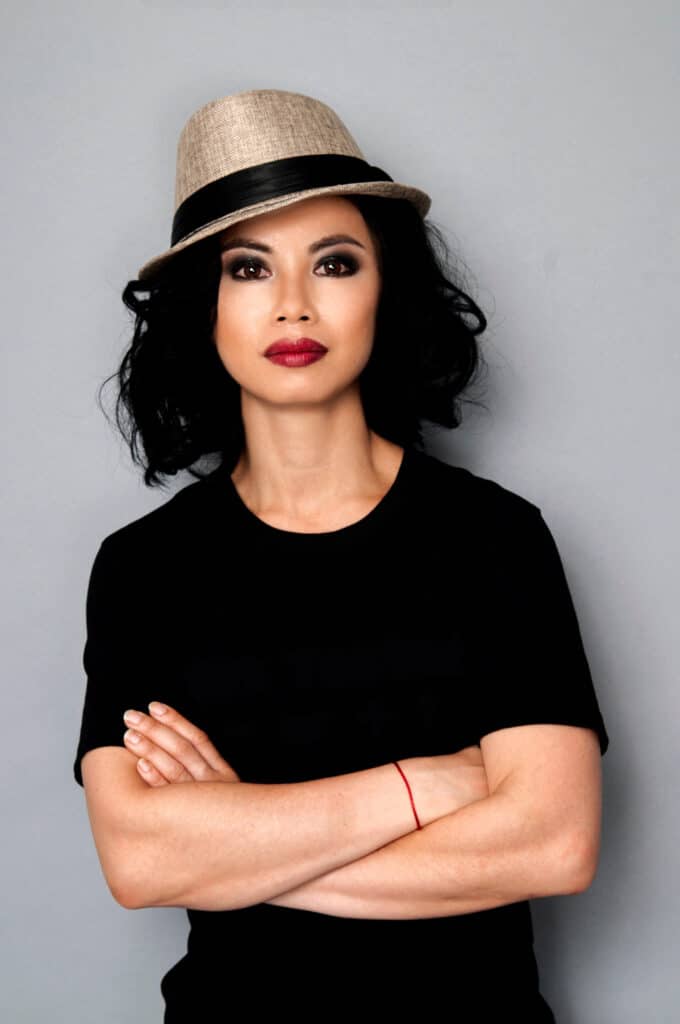How queer athlete Amazin LeThi overcame her past to fight for LGBTQ+ equality

LGBTQ+ activist Amazin LeThi started bodybuilding at the age of 6 after suffering constant bullying. (Alina Oswald/Official White House Photo by David Lienemann)
When queer bodybuilder Amazin LeThi was growing up, she didn’t have any LGBTQ+ Asian role models.
“I never saw an Asian LGBTQ+ person in the media,” she tells PinkNews.
“I saw how the sports world saw Asian athletes – being that one Asian kid stepping out onto the field and suffering.”
As a child LeThi recalls being subjected to “racism, constant harassment and bullying”, and feeling that she didn’t have the support she required.
“Not seeing any LGBTQ+ kids in sport made me feel that I could never be out in sports.”
But having struggled with discrimination and lack of representation for most of her life, LeThi has dedicated her life to demolishing prejudice.
She’s now a trailblazing queer athlete, whose advocacy work has stemmed from battling racism and homophobia, is determined to see LGBTQ+ people celebrated globally.
Over the past year, more sports stars have come out, since as Jack Jablonski, Zander Murray, Alba Palacios and Jake Daniels – something she celebrates, but describes as “a very new kind of athlete activism”.
Arnold Schwarzenegger’s influence
When she was young, Amazin – who’s Vietnamese, but grew up in Australia after being adopted by a white family – looked to bodybuilding legend Arnold Schwarzenegger for inspiration when she was young – and not just for his athletic achievements.
“I read about his life and how he struggled in the Western world, with his name, size, accent, and he became a positive role model in my life,” she says.
“He really knew how to celebrate himself and he also knew how to gain the support, love and celebration from others. He celebrated his unique identity.”
Amazin says relating to Schwarzenegger was the first time she was able to see herself in someone.
“I realised then I was able to celebrate my differences and I would find a way for the world to celebrate that as well.”
Team sports ‘a very hostile environment’
Amazin started weightlifting when she was six, and she soon found interest in bodybuilding.
“I wanted to get stronger because I was being bullied. Also I found team sports a very hostile environment because I got picked on by my team and had no support from the coaches or sports organisations.
“For me weightlifting was something I chose and was something I could do myself.”
But she recalls the environment was “misogynistic” and “very sexist”.
“Sport has always had these very rigid gender norms, but particularly in bodybuilding.”
She also says the sport has always been “very homophobic” and said she realised “very quickly there was no space for LGBTQ+ people.”
Scottish footballer Zander Murray recently described “living in fear 24/7” before he made history by coming out as gay.
‘Wanted to make a difference’
In her early 20s, Amazin admits she ended up “falling into the bad crowd”, and began using alcohol and drugs.
As a result Amazin ended up homeless for a number of years and she remembers this time as the “most difficult” point in her life.
“You have absolutely nothing, you’re very suicidal and have severe mental health issues, but I always knew I wanted to make a difference.
“I think it was my lifetime of sports that helped pull me out of homelessness. It was very difficult and I had a nervous breakdown doing it, but I’m so fortunate to have found a way out.
“This set me on a journey for the advocacy work I do today.”
Amazin made it her mission to share her painful stories with people in power in the hope of making a difference.
“What I’ve learned in my life is that my difference is what makes the world sparkle.
“I’m far much more successful and happier, waking up and showing off as my authentic self.”

Amazin Lethi is currently the world’s first and only Asian LGBTQ+ athlete to simultaneously hold multiple LGBTQ+ sports ambassador roles. (Alina Oswald)
Since her twenties Amazin has come a long way.
She is now an advisor to Fortune 500 companies, governments and international organisation such as the United Nations and The Princes Trust.
She was also part of Biden’s election campaign – Out For Biden – as their LGBTQ+ and Asian communication digital advisor.
Recently Amazin has become an ambassador for Sporting Heritage, where she helps profile the East Asian community and the LGBTQ+ sports heritage in the UK.

This year Amazin LeThi became the first Asian and Asian LGBTQ+ ambassador for Sporting Heritage. (Alina Oswald)
Focusing on marginalised groups such as the Asian community is close to Amazin’s heart.
“I focus on the difficulties we have in coming out and reasons we struggle so deeply and in silence.
“Our stories aren’t shared in the public domain we’re very much an invisible community in the LGBTQ+ community and there are few Asian LGBTQ+ role models.”
Representation in sports has got better over the years, but still needs to improve, according to LeThi.
She referenced the Euro 2020 championship which saw three Black England players – Bukayo Saka, Marcus Rashford and Jadon Sancho – subjected to a flood of racist comments for missing their penalty kicks.
“That’s the difficulty that ethnic minority groups are facing in terms of coming out. There is a double layer of harassment,” she says.
Qatar World Cup: ‘There needs to be a conversation’
Together with All Out, a global movement for love and equality, LeThi is working on creating a campaign to raise awareness of the implications of World Cup being held in Qatar.
Currently the country’s penal code punishes same-sex relations with up to seven years imprisonment, while queer Muslim men, under Sharia law, can be punished with the death penalty.
Assurance has been offered to LGBTQ+ fans by the Football Association that queer fans will be safe, but LGBTQ+ rights activist Peter Tatchell has told PinkNews he is sceptical about any promises made.
LeThi said: “The biggest issue with major sports events being held in countries with anti-LGBTQ+ laws is that there’s a responsibility from the sports organisations like FIFA and corporate sponsors because these events can’t be held without the sponsors.
“It’s important to think about safeguarding in terms of the LGBTQ+ athletes and spectators that go to these events.
“I think there needs to be a conversation around if the country should be allowed to hold such a major game.”

